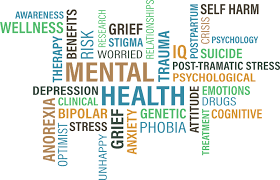Mental Health Resources
Community and Counseling Resources
The links below are provided as a resource for the families in our community. There is no intent on the part of the Diboll Independent School District or its employees to endorse specific agencies. This list is not inclusive of all available information or services. The parent is free to obtain other suggestions from any source.
Burke Mental Health Services
Thousands of East Texans face mental health challenges or crises every day. Many of them don't know where to turn for help. Burke provides complete mental health services to adults and children in East Texas. They have facilities, resources, and staff to help East Texans as in need. Services include: 24 Hour Crisis Line, Counseling and Treatment Interventions, and a Mental Health Emergency Center in Lufkin, Texas.
Services provided through the Burke Center include the following:
1. Emergency Services: The crisis hotline is available to anyone experiencing a mental health crisis or emergency.
2. Outpatient Clinics: They work with clients to identify psychiatric disorders, assess immediate and long-range mental health needs and provide appropriate treatment services that will stabilize symptoms.
3. YES Waiver Program: Youth Empowerment Services Waiver-Provides home and community-based services to individuals ages 3-18 who have a serious emotional disturbance. The YES Waiver work is channeled through a team approach that includes community providers, families, and their informal supports. For more information call 1-800-330-9560.
4. System of Care: Builds meaningful partnerships with families along with children and youth ages 3-20, addresses cultural and linguistic needs, and uses evidenced-based practices to help the child, youth and families function better at home, in school, in the community, and throughout life. For more information call 936-633-5600.
5. Specialized Treatment of Early Psychosis: A recovery-oriented treatment program for individuals ages 15-30 with a team approach to case management, doctor services, psychosocial rehabilitation, peer services, therapy, and supportive employment and/or education for up to two years based on need and preferences.
6. Early Childhood Intervention (ECI): Services help children from birth to age three overcome difficulties in early development.
To make an appointment or for general information about Burke's Mental Health Services call 936-634-5010 or 1-866-242-4556.
If you or someone you know is experiencing a mental health crisis, please call 1-800-392-8343 immediately.
Mental Health Services:
936-634-5010 or Toll Free 1-866-242-4556
Developmental Disabilities Services:
936-639-1479 or Toll Free 1-800-621-1523
Early Childhood Intervention Services:
936-634-4703 or Toll Free 1-877-205-3630
Substance Use Services:
936-634-5010 or Toll Free 1-866-242-4556
What Are Trauma-Informed Schools
Trauma-Informed Schools are where the adults in the school community are prepared to recognize and respond to those who have been impacted by traumatic stress. Those adults include administrators, teachers, staff, and parents, and law enforcement.
Five Things Children Who Have Experienced Trauma Need
-Safety
-Caring adults and positive relationships
-A feeling of accomplishment and success
-Choices and options allowing for routine and a sense of control over their lives
-Consistency
Perception is Reality
FACT: The Symptoms and Behaviors that children display can be as varied as the traumatic events they experience.
Traumatized children can enter a class believing that the world is a scary, threatening place. There is no one-size fits-all approach to supporting children who experience trauma.
www.esc7.net
Basic Facts about Child Trauma
- Trauma refers to extreme or chronic stress (toxic stress) that overwhelms a person's ability to cope and results in feeling vulnerable, helpless, and afraid.
-Experts explain that trauma is not an event itself, but instead a response to a stressful situation in which a person's ability to cope is dramatically undermined.
-For children, trauma occurs when a child experiences an event that causes actual harm or poses a serious threat to his or her emotional and physical well-being.
- One out of every 4 children attending school has been exposed to a traumatic event that can effect learning and/or behavior.
- Signs of traumatic stress includes fear, anger, withdrawal, trouble concentrating, digestive problems, and nightmares. Behavior disorders and "acting-out" can also be symptoms of trauma.
-A child's distress may not be obvious or visible. By talking with them you may discover that they are experiencing traumatic stress.
Marleen Wong,Ph.D, Director LAUSD Trauma Services Adaptation Center for Schools National Child Traumatic Stress Network/SAMHSA
We Can Prevent ACEs (Adverse Childhood Experiences)
Resources
https://www.samhsa.gov/child-trauma/understanding-child-trauma (Substance Abuse and Mental Health Services Administration)
https://www.cdc.gov/violenceprevention/childabuseandneglect/acestudy/index.html (Centers for Disease Control and Prevention)
https://www.nctsn.org/ (The National Child Traumatic Stress Network)
https://www.cdc.gov/childrenindisasters/index.html (Centers for Disease Control and Prevention)
https://victimsofcrime.org/ (National Center for Victims of Crime)
Supporting Your Child and Family During the COVID-19
Break The Stigma of Mental Health
It's not always easy to tell others that your child has challenges managing their thoughts or feelings. It might not be easy for your child to express that either. Even though it is normal for people of any age to experience these challenges, our culture has told us we need to fear them. In this video, we ask why it is this way and what we can all do to give each other the support we need to get help.
Children's Hospital Colorado (https://childrenscolorado.org/stigma)
Texas Health and Human Services
Texas Health and Human Services is providing a toll-free COVID-19 Mental Health Support Line. Frontline Workers are experiencing an unprecedented amount of stress due to the COVID-19 pandemic. Crisis Counseling Assistance and Training Program (CCP) for school personnel is also being offered.
The following are resources being provided by Texas Health and Human Services.


